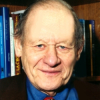Paul Kurtz

Paul Kurtz
Paul Kurtzwas a prominent American skeptic and secular humanist. He has been called "the father of secular humanism". He was Professor Emeritus of Philosophy at the State University of New York at Buffalo, having previously also taught at Vassar, Trinity, and Union colleges, and the New School for Social Research...
blessed heart adventure
As I see it, creative achievement is the very heart of the human enterprise... The destiny of man, of all men and of each man, is that he is condemned to invent what he will be - condemned if he is fearful but blessed if he welcomes the great adventure. We are responsible in the last analysis, not simply for what we are, but for what we will become; and that is a source of either high excitement or distress.
moral-development creative excellence
Many humanists have argued that happiness involves a combination of hedonism and creative moral development; that an exuberant life fuses excellence and enjoyment, meaning and enrichment, emotion and cognition.
philosophical views afterlife
Secular humanism does not have the essential attributes of a religion: belief in a deity, the wish for some sort of afterlife, sacred dogma or texts, or an absolutist moral creed. Instead, it expresses a philosophical and ethical point of view, and it draws upon the scientific method in formulationg its naturalistic view of the nature.
giving-up believe moving
I believe that a person should take an affirmative outlook. There are always problems in life, old and new, uncertainties, and unexpected contingencies. The optimal way to deal with this is not to give up in despair, but to move ahead using the best intelligence and resources that we have to overcome adversity.
emotional temptation scales
Most humans feel the transcendent temptation, the emotional drive to festoon the universe with large-scale meaning.
promise atheism belief
The skeptic has no illusions about life, nor a vain belief in the promise of immortality. Since this life here and now is all we can know, our most reasonable option is to live it fully.
reality roots inquiry
Skepticism is essential to the quest for knowledge, for it is in the seedbed of puzzlement that genuine inquiry takes root. Without skepticism, we may remain mired in unexamined belief systems that are accepted as sacrosanct yet have no factual basis in reality.
atheism enlightenment agendas
Secular humanism proposes ... the complete implementation of the agenda of modernism ... what is necessary for it to occur is a ... New Enlightenment.
christian religious children
Parents have no right to impose their religion on their children... A Fundamentalist Protestant parent has no right to expect the state to support his own narrow conception of education.
angel past age
UFO mythology is similar to the message of the classical religions where God sends his Angels as emissaries who offer salvation to those who accept the faith and obey his Prophets. Today, the chariots of the gods are UFOs. What we are witnessing in the past half century is the spawning of a New Age religion.
optimistic joy enthusiasm
Life, when fully lived under a variety of cultural conditions, can be euphoric and optimistic; it can be a joy to experience and a wonder to behold.
art good-life cheer
We are not simply intellectual creatures. We wish to make love, to enjoy a gourmet dinner, to jog in the park, to cheer lustily at a ball game, to engage in spirited conversation with our friends, to play bridge or tennis, travel to exotic places, struggle with others to build a better world, and to enjoy the arts. The arts are so vital because they help to make life worth living. Music, poetry, literature, paintings, dance, and the theater are among our richest joys...The fine arts contribute immeasurably to the good life and that is why we cherish them.
religious party communication
Free inquiry entails recognition of civil liberties as integral to its pursuit, that is, a free press, freedom of communication, the right to organize opposition parties and to join voluntary associations, and freedom to cultivate and publish the fruits of scientific, philosophical, artistic, literary, moral and religious freedom.
independent opportunity destiny
Human life has no meaning independent of itself. There is no cosmic force or deity to give it meaning or significance. There is no ultimate destiny for man. Such a belief is an illusion of humankind's infancy. The meaning of life is what we choose to give it. Meaning grows out of human purposes alone. Nature provides us with an infinite range of opportunities, but it is only our vision and our action that select and realize those that we desire.